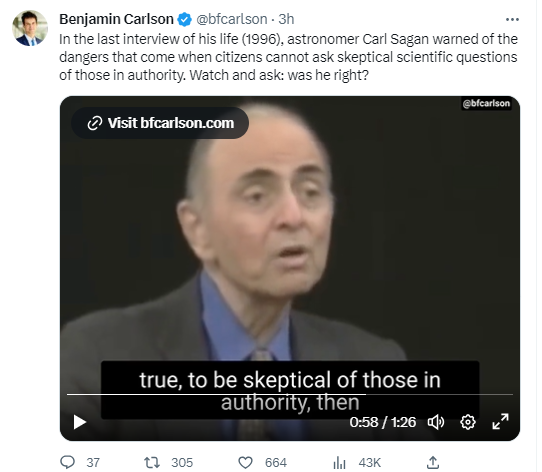The Machinations Inside the Mind of Those Who Censor
Most of those who wield political and financial power treat the American People like tiny children or even sheep. They are permeated with the hubris that only they are strong and pure enough to know what is going on. They constantly try to convince themselves that the People can’t handle the truth. For a deep dive into their inner psychology and a detailed history of how censorship always fails, I highly recommend Robert Corn-Revere's book, The Mind of the Censor and the Eye of the Beholder (2021). Here are a few excerpts:
Censors may wield great power and enjoy political favor - for a time - and can ravage individual lives and reputations. But they are also the subject of popular derision and generally end up on the wrong side of history - in the United States, at least. This is why those who actively seek to suppress speech try vehemently to deny that their actions amount to “censorship,” and why they often feel beleaguered even as they marshal the power of the state to serve their purposes. Defensiveness pervades their occupation. Those who engage in the business of censorship have an inferiority complex for a reason - at some level they understand that their enterprise is fundamentally un-American . . .
“The message of the censor is clear and unmistakable: I (or we) know the truth, and must control the ideas or influences to which you may become exposed to protect you from falling into error (or sin). Truth may be revealed by whispers from god, by political theory, by popular vote, or by social science, but once it has been determined, the time for debate is over. Anthony Comstock did not invent censorship, but his DNA may be found in the genetic code of every would-be censor who walks the earth. As Supreme Court Justice Anthony Kennedy put it: “Self-assurance has always been the hallmark of a censor.” In this respect, he echoed Mencken’s assessment of vice crusaders that “[their] very cocksureness is their chief source of strength.”” . . .
There appears to be a psychological dimension to the censor’s dilemma as well. What can one say about the type of person who devotes his or her life to denouncing certain types of expression and advocating its prohibition while choosing a profession in which he immerses himself in it? Purity crusaders claim to hate the stuff they want to suppress and argue that it will ruin all who are exposed, but invariably they can’t get enough of it. They search it out, collect it, study it, categorize it, archive it, talk about it, and display it to others, all for the ostensible purpose of making such expression cease to exist. . .
Activists of all political stripes surround themselves with the type of speech they believe must be suppressed for the good of others yet mysteriously claim to be immune to its dangerously toxic effects. Could it be that such people are drawn to their work because of the opportunity to spend countless hours communing with the forbidden? As Sydney Smith, a noted British writer and cleric of the nineteenth century, observed: “Men whose trade is rat-catching love to catch rats; the bug destroyer seizes upon the bug with delight; and the suppressor is gratified by finding his vice.” It is not beyond belief that censorship is an ultimate act of self-gratification, and that our rights are sacrificed on an altar of the censor’s guilty pleasure. . . .
Because the urge to censor derives from personal preferences or policy positions, no political party or philosophy is immune from the impulse to suppress contrary views. One oft-expressed stereotype is that conservatives favor censorship while liberals oppose it, but one needn’t search long to find numerous counterexamples, as later chapters will explore. Liberals and conservatives alike, regardless of how one might define those philosophies, appear to agree that the machinery of government can rightfully be used to restrict speech, provided the targeted expression is sufficiently vile (from their point of view) or insufficiently valuable (using their scale as a measure). The problem is that the competing factions never can seem to agree on which speech should be banned. . . .
George Orwell, in his 1946 essay Politics and the English Language, wrote that political euphemism “is designed to make lies sound truthful and murder respectable, and to give the appearance of solidity to pure wind.” He observed that “[djefenseless villages are bombarded from the air, the inhabitants driven out into the countryside, the cattle machine-gunned, the huts set on fire with incendiary bullets: this is called pacification.” “In our time,” Orwell concluded, “political speech and writing are largely [employed in] defense of the indefensible.” Updating Orwell's example, genocide came to be known in the 1990s as “ethnic cleansing.” . . .
The ensuing chapters explore various incarnations of censorship in American history, beginning with the rise and decline of Anthony Comstock, the nation’s first professional anti-vice crusader. His career set the standard, and, for many, the rhetorical tone, for those seeking to condemn various forms of speech. Although all who follow in Comstock’s outsized footsteps try to claim moral superiority - characterizing the speech they would restrict as distasteful, trivial, valueless, or downright harmful - the plain fact is that the censor in a free society never has the moral high ground. The censor’s dilemma is that somewhere, down deep inside, he - or she - is painfully aware of it. . . .
Insurance Actuaries and Canadian Doctors: Why Are So Many Young People Dying?
Insurance actuaries are sounding the alarm. What is going on?
Life insurance actuaries are reporting that many more people are dying – still – than in the years before the pandemic. And while deaths during COVID-19 had largely occurred among the old and infirm, this new wave is hitting prime-of-life people hard.
No one knows precisely what is driving the phenomenon, but there is an inexplicable lack of urgency to find out. A concerted investigation is in order.
Deaths among young Americans documented in employee life insurance claims should alone set off alarms. Among working people 35 to 44 years old, a stunning 34% more died than expected in the last quarter of 2022, with above-average rates in other working-age groups, too.
“COVID-19 claims do not fully explain the increase,” a Society of Actuaries report says.
Carl Sagan Explains the Critical Need to be Skeptical
As Carl Sagan explains, meaningful conversation involves constant skepticism and testing of viewpoints and claims. Anything else is kayfabe conversation. Any attempts to outlaw or discourage skepticism or testing of any viewpoint or claim is an attempt to dehumanize the other person, to force them to become your puppet = Nietzschean ressentiment.
Meaningful Conversation is Like Sex
Last week Bret Stephens gave a talk on the culture of free speech at the University of Chicago. I often don't agree with Stephens, but I think he's on target with this commentary Here is an excerpt:
I hope you do, whether you choose to lead a private or a public life. And I hope you do so by writing your own version of “The Joy of Argument” — which is like a similarly titled book from 50 years ago, updated for an era that has become curiously and depressingly afraid of both. The joy of argument is not about “owning” or “destroying” or otherwise trying to disparage, caricature or humiliate your opponent. On the contrary, it should be about opposition and mutuality, friction and delight, the loosening of inhibitions and the heightening of concentration, playfulness and seriousness, and, sometimes even, a truly generative act.
Yes, I am comparing great arguments to great sex. But the analogy bears a brief follow-through because, in the last analysis, the only way in which we are going to create institutions in which independent thought and free expression flourish isn’t through a declaration of principles, however well constructed it may be — at best, those principles can only lay the ground for what we are trying to achieve. Nor can it be on account of some worthy but abstract goal, like the health of democracy — which, again, is wonderful, but rarely motivates people to action.
We are going to succeed at the task only when we persuade others, and ourselves, that these things you’ve all been doing at the University of Chicago for the past few years — discussing and debating and interrogating and doubting and laughing and thinking harder and better than you ever did before — aren’t the antithesis of fun. They are the essence of it. They make up the uniquely joyful experience of being authentically and expressively and unashamedly yourself and, at the same time, having a form of honest and intimate contact with others who, in their own ways, are being authentically and expressively and unashamedly themselves.
He is well aware that many of us don't speak up. Why? He lists four reasons:
1. "First, the problem isn’t that people aren’t smart. It’s that they are scared."
2. Some arguments that sound persuasive are severely defective. "Will you be able to notice the underlying flaw in an idea when the arguments for it sound so persuasive?
3. It's pleasurable to bask in the emotional warmth of one's tribe: "They go along to get along, because the usual emotional companion to intellectual independence isn’t pride or self-confidence. It’s loneliness and sometimes crippling self-doubt. Is that a price you are willing to pay?"
4. Our culture fails to protect those willing to earnestly participate in wide-open conversations: "Does the culture of a society, or of an institution, encourage us to stand out or to fit in; to speak up or to bury our doubts? Does it serve as a conduit to groupthink, or as an obstacle to it?"


